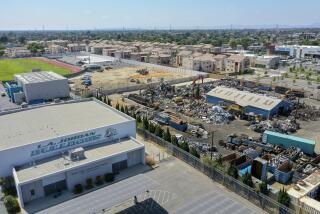Abandoning mine safety
- Share via
Coal mining is a highly dangerous endeavor, but that doesn’t mean explosions are inevitable -- in fact, mining safety experts say that every deadly accident, including Monday’s blast at the Upper Big Branch mine in West Virginia, is preventable. So what went wrong?
Although the cause of the explosion, which killed at least 25 people, hasn’t been determined, it’s probable that a buildup of methane gas or coal dust was to blame. Indeed, federal regulators have issued 124 citations on the mine so far this year for safety violations, including some related to improper ventilation of methane. What’s clear from the Upper Big Branch disaster is that tough new rules put in place following the deaths of 12 miners at the Sago mine in West Virginia in 2006 still don’t go far enough, and penalties imposed on mining companies that break them are too easy to evade.
The safety record of Upper Big Branch mine owner Massey Energy might be, as company executives claim, better than the industry average. But that’s not saying much. Since the new regulations were imposed four years ago, federal officials have noted hundreds of violations at the mine and proposed $1.77 million in fines -- yet Massey has paid only about $365,000. That’s because mine owners can appeal citations, and lawyers can drag out the adjudication process for years. The government can shut down mines with a history of significant safety violations, but such charges go on a company’s record only after the appeals have been resolved. So operators can continue to run a potentially unsafe mine long after inspectors have put up red flags, which is something Congress should address.
Massey Chief Executive Don Blankenship has been a focus of public outrage since the explosion, in large part because he was a deeply unpopular figure long before this week. Blankenship, an influential board member of the U.S. Chamber of Commerce, calls climate change a “hoax and a Ponzi scheme” and has been an outspoken opponent of legislation to fight it; his apparent disregard for worker safety has also made him a target of organized labor. Along with comments that have struck mine workers as insensitive following past deadly accidents, Blankenship is notorious for a 2005 memo in which he urged supervisors to make coal production their top priority, presumably trumping safety concerns. Months later, a fire broke out at a Massey-owned coal mine in West Virginia that killed two miners.
Perhaps there’s no connection between Blankenship’s stance on labor and environmental issues and Monday’s explosion. Yet disaster is the inevitable outcome when the pursuit of profits causes leaders to ignore overwhelming scientific evidence about the environmental damage of coal burning or the great, preventable dangers of coal mining. Upper Big Branch only serves as the latest reminder of that truism.
More to Read
Sign up for Essential California
The most important California stories and recommendations in your inbox every morning.
You may occasionally receive promotional content from the Los Angeles Times.










